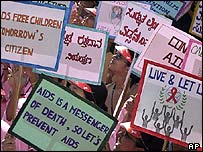The Raffa Home, one of the community projects supported by Names Not Numbers, is a home for children living with HIV/AIDS. One of the NNN trustees, Lucy, who spent several months living in the home in 2005, and a further few weeks visiting in 2007, shares below a brief history of the work being done around HIV/AIDS in India.

When discussing the problem of HIV/AIDS in India the first thing to note is just how young it is. That’s not just a reference to the estimated million children who have lost one or both parents to the disease, but to the historical fact that the first recognised case of the disease was in 1986.
That’s only 24 years ago.
A Guardian article on the issue a few years ago makes the point that the plight of the vast- and ever growing- numbers of AIDS orphans in India ‘goes virtually unnoticed’, with aid agencies warning that ‘children affected by Aids are being ignored and increasingly left to fend for themselves.’ World Vision report that the stigma attached to the disease means that children orphaned or affected by HIV/AIDS can be denied education or entry into some orphanages and are often, as a result, ‘forced into child labour’.
The boys in the Raffa Home are an average of 16 years of age, with most being born in or around 1995. That’s less than 10 years after the first case was discovered in Chennai, and 4 years before the second phase of India’s National AIDS Control Programme (NACP II) was launched. The first phase started in 1987, as an almost-immediate response to the problem. The first phase had focused on ‘surveillance, blood screening, and health education’, whilst the second phase began with the stated aim of ‘reducing the spread of HIV through promoting behaviour change’. Avert, an international HIV/AIDS charity, states that it was crucially only in 1999 that ‘the prevention of mother-to-child transmission (PMTCT) programme and the provision of free antiretroviral treatment were implemented for the first time’.
1999. That means for the residents of the Raffa Home, along with thousands of other children born earlier that decade across India, it was already too late.
The good news is that the campaign for treating and preventing the epidemic continues, with the third phase launched in 2007. This focuses largely on preventing the disease through various awareness-raising campaigns, including advertising, which is necessary because of the huge stigma that continues to be associated with AIDS in many communities.
The problem is that a mere 1/6 of the money is reported to be being spent on treatment. The most common anti retroviral (ARV) drugs, essential to keep the onset of AIDS at bay for all HIV sufferers, are not widely available in India, with an estimated 1 in 4 individuals receiving the level of treatment they need. This is down to a number of factors, including unequal distribution of resources across the vast sub-continent. There are also problems with those individuals who build up immunity to the most commonly used ARVs, as the so-called ‘second line’ drugs are costly in India due to patenting laws.
The Raffa Home is in Delhi, the country’s capital, and resources are not so scarce here as in some more rural areas. This means the boys are able to access the ARVs they need. As a result, along with the consistent support they are offered by their family and community, and the persistent prayers of supporters, they are all growing strong and healthy. Children born with HIV do not have any guarantees, and their loved ones cannot take a long life expectancy for granted, so their ongoing health and vitality is truly a cause for celebration!
This is only the tip of the iceberg- HIV/AIDS is a complex subject and the history of its recognition and treatment in India is convoluted and ever-changing. The important thing to remember is that because of organisations like the Raffa Home providing basic but vital services to protect, love and support orphans of the disease, we can look ahead with hope.
Could you support the work of the Raffa Home today? Please click on the donate section to give whatever you can. It really does make a life-changing difference to each and every child in the Raffa Home.



